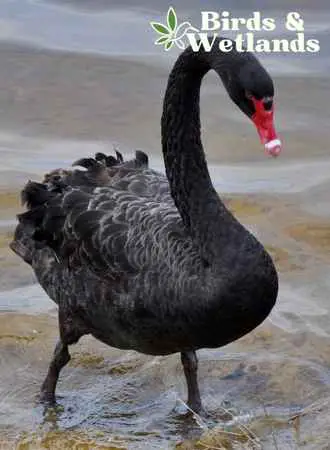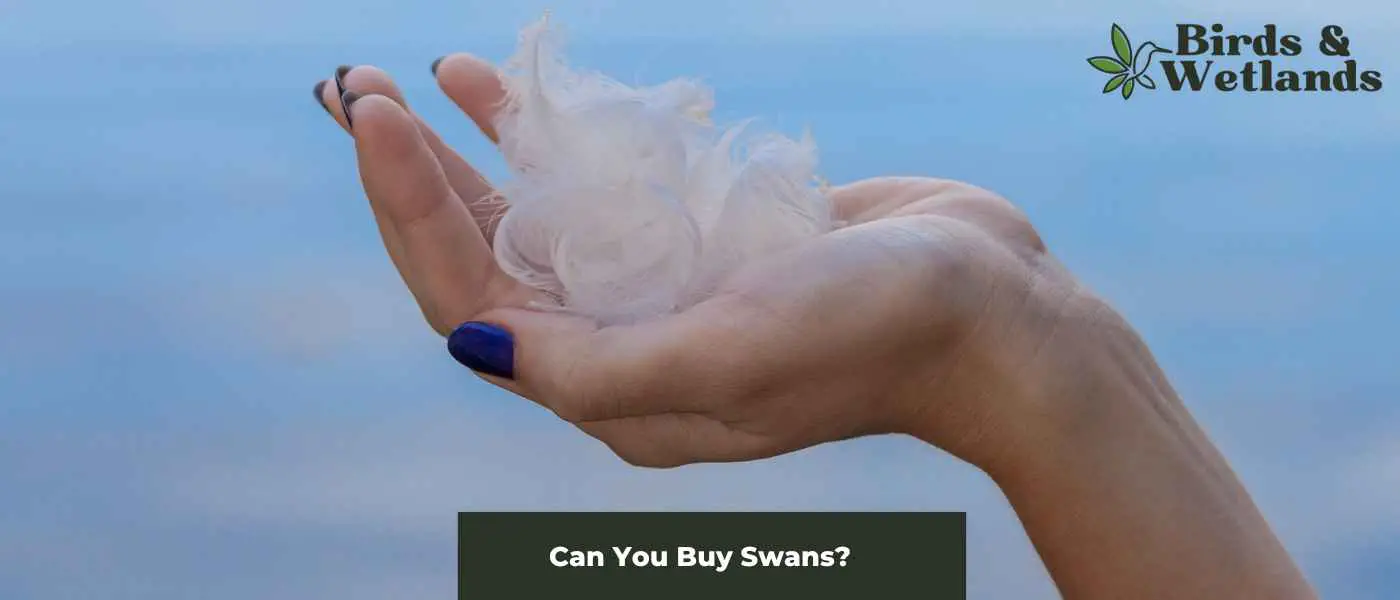Swans are majestic and elegant birds that have long been admired for their beauty and grace. They are often associated with romance and love, and their presence in a water body can add elegance and serenity to any landscape. But can you actually buy swans?
The answer is yes, but it’s important to understand the rules and regulations surrounding the purchase and ownership of these wild birds.
We’ll take a closer look at swan ownership and provide answers to some questions potential swan owners may have.
Key Takeaways on Buying Swans
- Swans are majestic and elegant birds that are available for purchase in the United States, but there are a few ethical considerations that need to be taken into account before making the purchase.
- Swans typically cost between $1,500-$3,500 for a breeding pair and may be found from commercial hatcheries or private sellers.
- Potential swan owners should consider their ability to provide suitable space for them to live in and if they’re willing to take on the time commitment of caring for them.
What are the ethical considerations surrounding the practice of keeping swans as pets?
There are a few different points to consider regarding the ethical considerations of keeping swans as pets.
It’s important to remember that swans are wild animals, and it is not natural for them to live in captivity.
Keeping swans as pets can disrupt their natural behavior, as they are not used to being confined to a small space. They need a large pond or lake to swim in and a big area of land to roam and forage for food. If you don’t have the space to provide for them, keeping one as a pet is not a good idea.
Captive mute swans are naturally very protective of their territory. They’ll do whatever it takes to defend their home and family, including chasing off other animals, humans, and even boats that come too close to their space.
This territorial behavior can be quite intense and even dangerous, especially if you have young children or other pets that might accidentally wander into the swan’s territory.
In addition to their territorial nature, swans are also known for being quite aggressive. They have been known to attack people and other animals if they feel threatened or perceive someone as a threat to their territory or their family. Their strong beak and wings may not inflict serious injury but can be painful and cause discomfort.
Another ethical consideration is the cost of caring for a swan. Swans require special diets, veterinary care, and a large area to live in. This cost can be prohibitive for many people, and it’s important to consider whether you can afford to meet the needs of a swan before taking one into your home.
Keep in mind that you may own swans but these birds are not truly domesticated like chickens, geese and ducks. Swans should not live in an closed space or enclosure. Of course, you need to protect these birds, their babies called cygnets and nests from predators such as wolves, foxes, snakes and raccoons. But these swans with their offspring need to roam-free on your property.
Finally, it’s important to know the laws and regulations surrounding swan ownership. In some areas, there may be restrictions on the size or type of enclosure you can use for your swan or even laws banning the ownership of swans altogether.
Three species of swans appear on the list of protected birds under the Migratory Bird Treaty Act (MBTA). These swans are the trumpeter swan, tundra swan and whooper swan. The feral mute swan (Cygnus olor) is not in the list but some states provide protection for the bird despite being considered an invasive species.
It’s important to do your research and ensure you’re following all applicable laws and regulations. Most states have their own regulations regarding swan ownership so it is commended to contact your local wildlife service office.
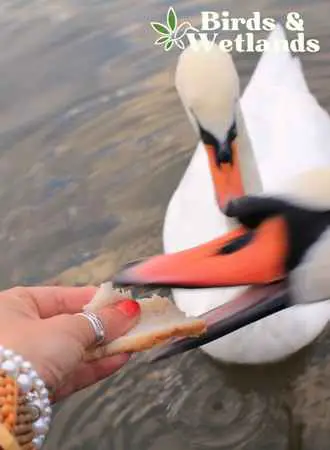
How much does a swan cost?
It may be surprising to most people, but did you know that buying a swan in the United States can actually cost quite a bit?
For instance, if you’re looking for the iconic mute swan—typically associated with large beautiful lakes and scenic ponds—you could expect to pay anywhere from $1,500 to $3,500 for a breeding pair of a male and female swans. Other swan species such as the trumpeter swans may cost upwards of $6,000.
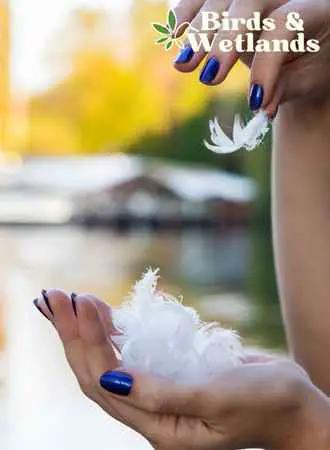
Where can you purchase swans?
There are multiple avenues available for those looking to purchase swans. Depending on the varieties desired, swans may be found for purchase from both commercial hatcheries and private sellers.
Those interested in purchasing different breeds of swans can likely find them at avian-specialized pet stores, while visitor centers and wildlife sanctuaries may offer non-traditional swans.
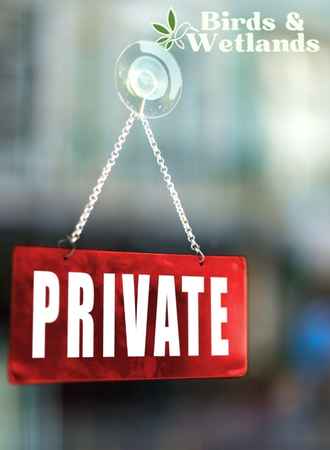
What things to consider before buying swans?
If you’re considering buying a breeding pair of adult swans, consider a few things before purchasing.
First and foremost, you’ll need a suitable space for them to live in. Swans are large birds with a lot of room to move around and stretch their wings.
They also need water to swim in. If you don’t have a pond or lake on your property, you’ll need to create one or find a nearby body of water that you can use.
Next, you’ll need to think about the cost of owning swans. They can be quite expensive to keep, especially if you plan to breed them. You’ll need to factor in food, veterinary care costs, and any necessary repairs or upgrades to their living space.
You also need to consider if you’re willing to take the time and effort to care for a breeding pair of swans. These birds require a lot of attention, especially when nesting and raising their young. If you’re not prepared to invest the time and energy into taking care of them, it may not be the right decision for you.
It’s also important to note that in some areas, it may be illegal to own swans. Before you make a purchase, check with your local government to see if there are any laws or regulations regarding swan ownership.
Finally, consider the impact owning a breeding pair of swans may have on the local ecosystem. In some cases, non-native swans can disrupt the balance of the local ecosystem, so it’s important to consider the potential impact before making a decision.
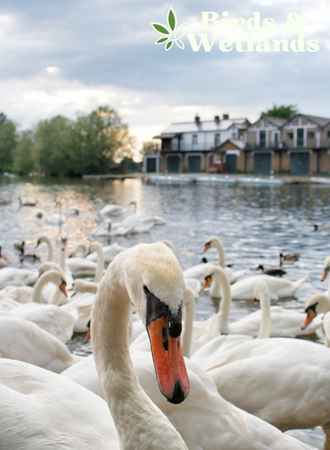
How to attract wild swans to your pond or lake?
If you can’t afford to buy swans or are just too busy with other things and can’t take care of them, but you still want these majestic birds in your pond or lake, then attracting mute swans is your best option.
One of the best ways to attract swans onto your pond or lake is by creating a swan island. A swan island is an area of land in the middle of a body of water that serves as a safe haven for swans and other waterfowl.
To replicate the natural habitat of mute swans or black Australian swans, it should include vegetation such as reeds, sedges, shrubs, grasses and trees that swans love. These plants also provide shelter from predators and can act as bird nest sites during the breeding season.
Additionally, providing food sources such as grains or corn and plenty of aquatic vegetation can also help convince wild waterfowl to stay on your private pond or lake.
Another way to bring wild swans to your private property is by improving the water quality. Wild swans need clean and healthy aquatic ecosystems to thrive – so water testing should be done regularly to ensure no pollutants are present in the water.
Adding oxygenating plants such as water lilies can also help boost dissolved oxygen levels in the water, which will provide additional benefits for wildlife such as fish and amphibians – making it more attractive for wild swans to take up residence on your lake or pond.
Lastly, providing a place for nest-building materials can be beneficial for attracting wild swans onto your pond or lake. Set up areas with logs, rocks, sticks and twigs that the birds could use during their breeding season or in the early spring.
In addition, providing nesting boxes which are securely mounted on poles above the water line may provide an ideal area for breeding pairs of swans to lay their eggs safely out of reach from predators. It can also provide protection for their cygnets.

Can you own Australian black swans in the US?
It’s possible to own Australian black swans in the US, though not everyone is familiar with this waterfowl breed. They are native to Australia and are usually noticeably larger than non-Australian birds and have elegant black plumage.
In captivity, they require a large area with an appropriately sized pond and they eat plenty of plants and grass.
The Australian black swan is relatively rare in the US due to their preferred habitat and climate. For instance, if you live in northern Indiana where it is extremely cold in the winter, you may not want to own Australian black swan.
